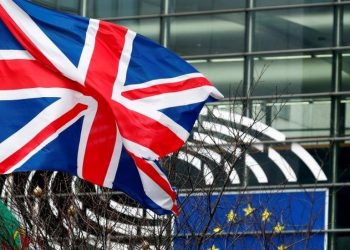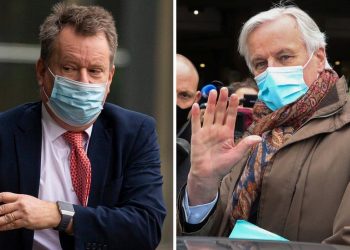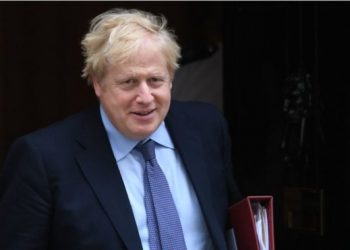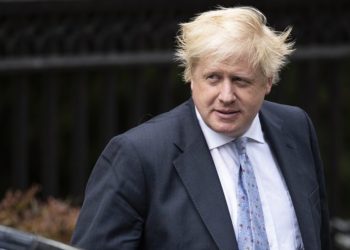Theresa May is making a final bid to save her Brexit deal ahead of a crunch Commons vote.
Battling a sore throat after late night talks with the EU, the prime minister urged MPs to back her “improved deal” or risk “no Brexit at all”.
But some leading Tory Brexiteers and the DUP, who keep her government in power, have rejected the deal.
They say the legal assurances secured by the PM are not enough to prevent the UK being tied permanently to the EU.
Sir Bill Cash, a leading member of the European Research Group, said: “In the light of our own legal analysis and others we do not recommend accepting the government’s motion today.”
Sir Bill was part of a panel of legally-trained panel of Brexiteer MPs who examined the PM’s revised deal, concluding that it did not deliver the binding changes MPs had demanded.
ERG chairman Jacob Rees-Mogg said he had not yet decided which way to vote, as the group prepared to meet.
The DUP said in a statement that “sufficient progress has not been achieved at this time”.
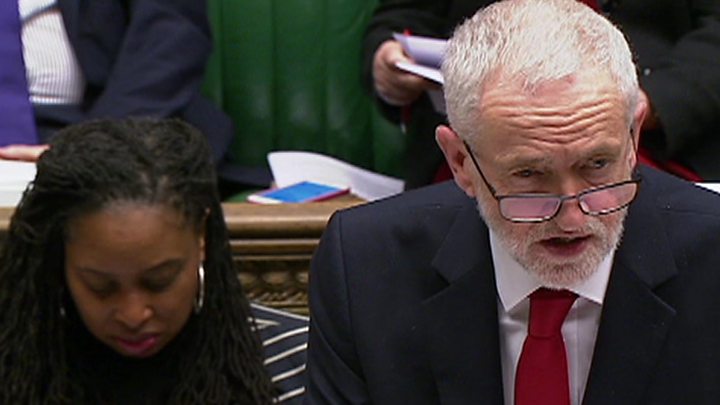
With husband Philip watching from the public gallery, Mrs May made a final plea to MPs to “come together” and “prove beyond all doubt that democracy comes before party, faction or personal ambition”.
“This is the moment and this is the time,” she said.
“Back this motion and get the deal done, because only then can we get on with what we came here to do – what we were sent here to do.
“We cannot serve our country by overturning a democratic decision of the British people.”
Labour leader Jeremy Corbyn said that “after three months of running down the clock” the prime minister had “achieved not a single change to the withdrawal agreement”.
He said it was the same “bad deal” MPs had rejected in January and Labour would be voting against it again because it “risks people’s living standards”, jobs and the NHS.
The last time Mrs May’s withdrawal agreement was put to Parliament in January, it was voted down by a margin of 230.
MPs will pass judgement on the revised version of her deal at about 7pm. Commons Speaker John Bercow did not select any of the amendments to the government motion that had been tabled by MPs.

Another dreadful day for No 10
As things stand the number of switchers seems far less than required to avoid another defeat for the prime minister. Last time out she was beaten by a record 230 votes.
One cabinet minister guessed the number tonight might be around 150. Everyone is guessing still.
But this looks like another dreadful day for Number 10, and another moment when doubts will be on display about not just the divorce deal with the EU, but about the prime minister’s leadership too.
Something has changed yes, but not enough.
Charles Walker, vice chairman of the 1922 Committee of backbench Tory MPs, said defeat for the government in the vote later would lead to a general election.
He told BBC Radio 4’s World At One: “If it doesn’t go through tonight, as sure as night follows day, there will be a general election within a matter of days or weeks.
“It is not sustainable, the current situation in Parliament.”
He added: “She will lead us into that general election. We haven’t got time for a leadership election.”
Downing Street said: “We are not preparing for and we do not want a general election.”
Attorney General’s legal advice
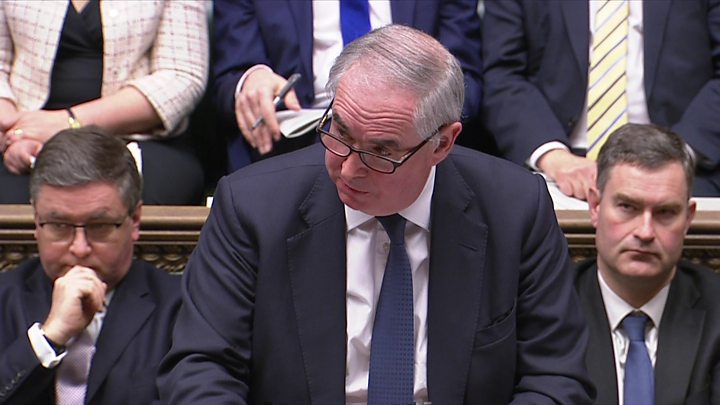
It comes after Attorney General Geoffrey Cox told MPs the legal risk of being tied to the EU after Brexit “remains unchanged”.
He added that the new assurances secured by the PM did “reduce the risk that the United Kingdom could be indefinitely and involuntarily detained” in the Irish backstop if talks on the two sides future relationship broke down due to “bad faith” by the EU.
He defined “bad faith” as a “pattern of refusing to accept reasonable proposals” on the Irish backstop.
But he said the question of whether a satisfactory post-Brexit deal on a permanent trading relationship can be reached remained “a political judgment” – and he said MPs should back the PM’s deal.
In his advice, Mr Cox said “the legal risk remains unchanged” that if a post-Brexit trade agreement can not be reached due to “intractable differences”, the UK would have “no internationally lawful means” of leaving the backstop without EU agreement.
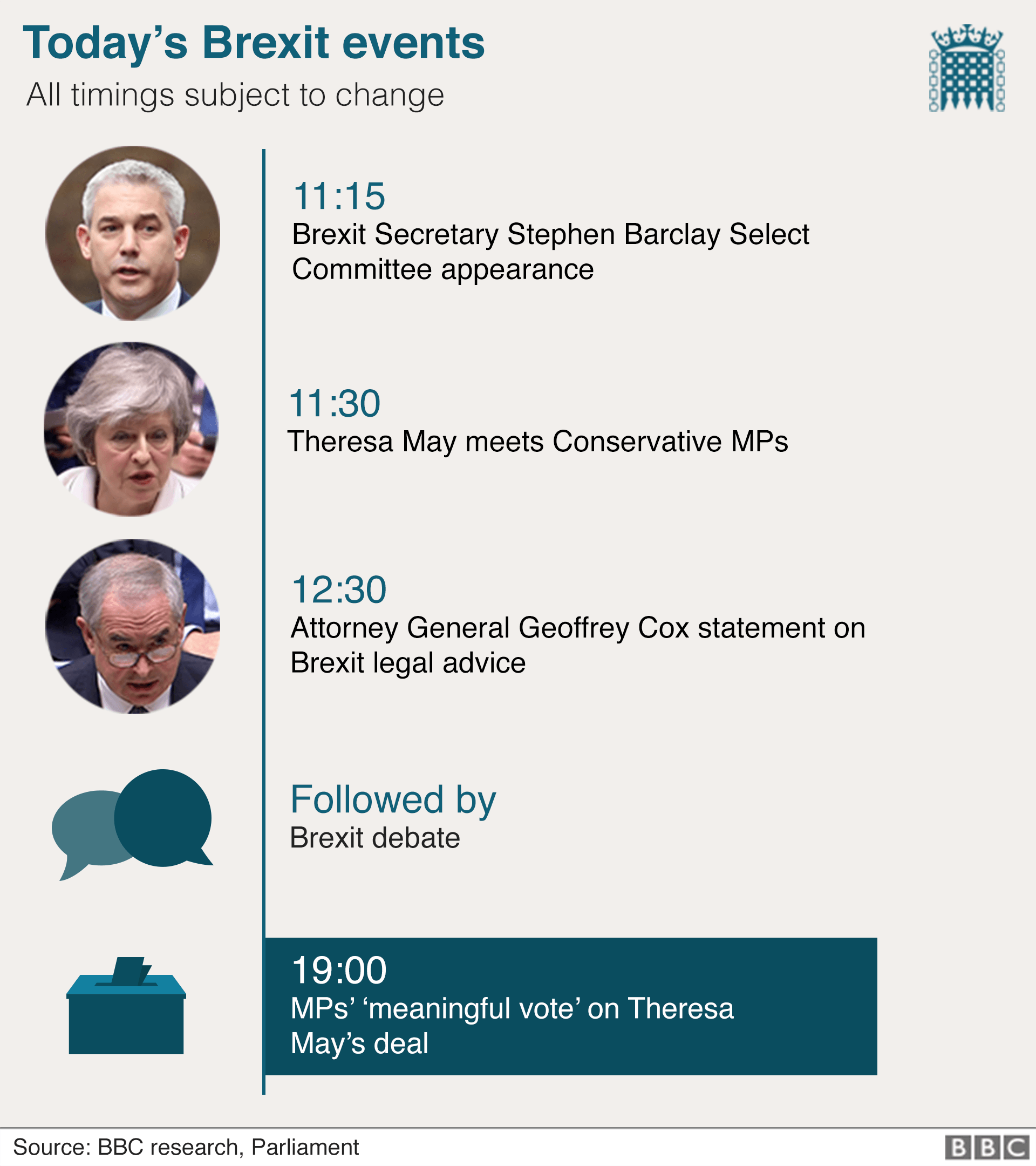

More reaction from MPs
Mrs May earlier addressed a meeting of Conservative MPs, in an effort to change the minds of those opposed to her deal.
Conservative MPs leaving the meeting suggested half of those who voted against deal last time will switch to support it later, said BBC’s Chief Political Correspondent Vicky Young.
Work and Pensions Secretary Amber Rudd said she believed the prime minister’s deal would go through “otherwise instability will follow which would be so unwelcome”.
What was agreed with the EU?
Documents were agreed after Mrs May flew to the European Parliament with Brexit Secretary Steve Barclay for last-minute talks with Mr Juncker and EU chief Brexit negotiator Michel Barnier.
- A “joint legally binding instrument” on the withdrawal agreement which the UK could use to start a “formal dispute” against the EU if it tried to keep the UK tied into the backstop indefinitely.
- A joint statement about the UK and EU’s future relationship which commits to replacing the backstop with an alternative by December 2020.
- A “unilateral declaration” stating there is nothing to stop the UK from leaving the backstop if discussions on a future relationship with the EU break down and there is no prospect of an agreement.
Many MPs fear the backstop, initially agreed by the UK government in December 2017, would keep the country in a customs arrangement with the EU indefinitely.
The PM has claimed the new documents addresses this issue and urged MPs to back the “improved deal”.
The EU warns ‘this is it’
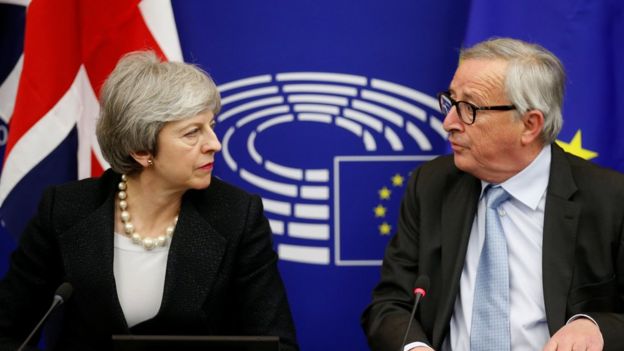 Theresa May and Jean-Claude Juncker gave a joint press conference after late night talks in Strasbourg
Theresa May and Jean-Claude Juncker gave a joint press conference after late night talks in StrasbourgThe UK is set to leave the EU on 29 March 2019 after voting to leave by nearly 52% to 48% – 17.4m votes to 16.1m – in 2016.
Mr Juncker has warned MPs they would be putting everything at risk if they voted down the deal.
“In politics sometimes you get a second chance,” he said. “It is what we do with that second chance that counts. There will be no third chance.”
The Irish Prime Minister Leo Varadkar said the new agreements showed both sides’ “good faith” – although he made clear they did “not undermine” the principle of the backstop or how it might come into force.
–
Source: BBC







